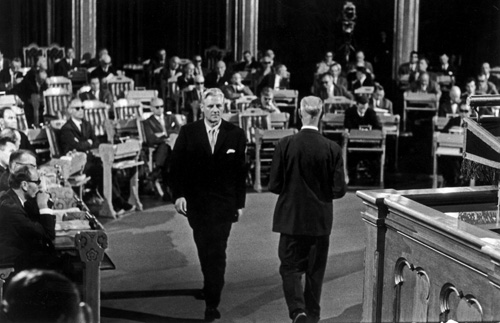Motions of no-confidence
The parliamentary system implies that the electorate, by electing the members of Parliament, indirectly decides which political forces are to govern. If the Storting by a formal vote expresses a lack of confidence in the Government, the Government must resign.

John Lyng and Einar Gerhardsen. The Gerhardsen government lost a motion of no-confidence in 1963 and had to resign. Photo: Scanpix.
A motion of no-confidence may either be directed against the sitting government as a whole or a particular government minister. The reason behind a motion of no-confidence may be a specific decision taken by the government or government minister in question, or general disagreement with the government’s or government minister’s policies. There do not have to be particular grounds for tabling a motion of no-confidence.
There are two methods of tabling such a motion. Firstly, a motion of no-confidence may be put forward as a Private Member’s Motion, i.e. submitted in advance and tabled in the Storting at either the beginning or end of a sitting of the Storting and subsequently put on the Storting’s order paper. Alternatively, it may be tabled as a regular motion in connection with a matter under consideration.
A motion of no-confidence usually opens with the following words: “The government minister … / The Government … does not have the confidence of the Storting”, or “The Storting regrets the Government’s … decision …”. The use of the word «regret» makes it absolutely clear that a motion of no-confidence is being tabled.
The usual practice during a motion of no-confidence is to call a roll call vote. To date, only two Norwegian governments have lost motions of no-confidence, the Hornsrud Government in 1928 and the Gerhardsen Government in 1963. Other than this, there have been two occasions when a motion of no-confidence has been close to gaining a majority in the Storting:
- A motion of no-confidence was tabled in June 1987 against the Labour Party Government by the Conservative Party, the Christian Democratic Party and the Centre Party on account of the Agricultural Agreement. The Progress Party did not support the motion, which was consequently defeated.
- A motion of no-confidence was tabled against the same government by the Conservative Party, the Christian Democratic Party and the Progress Party, also in June 1987. This time the Centre Party declined to support it, and the motion was once again defeated.
Since Article 15 of the Constitution was adopted in 2007, a government minister or a government that has lost a vote of no-confidence in the Storting is legally obliged to resign.
See also
Last updated: 26.09.2022 23:25